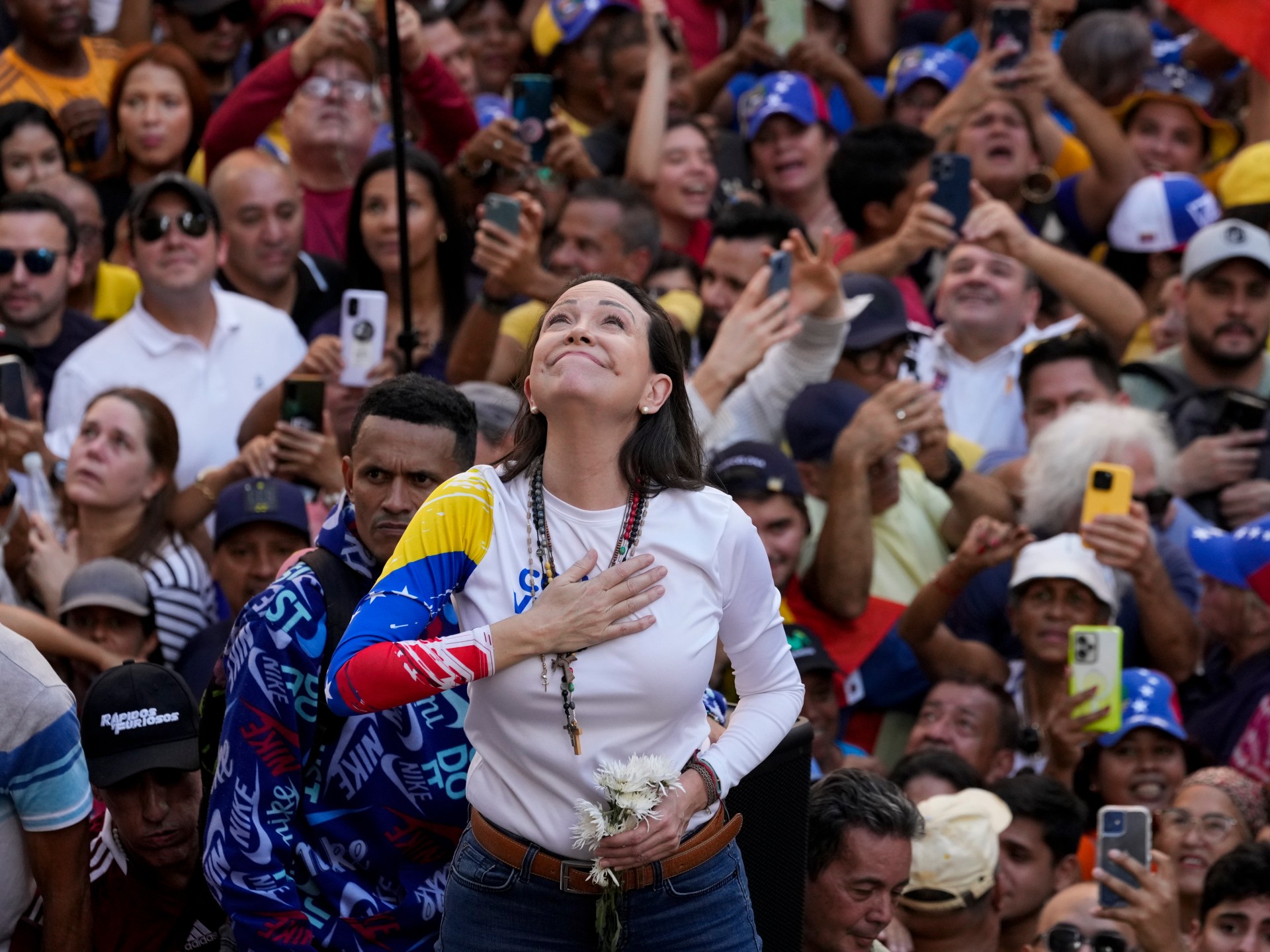Maria Corina Machado, a key opposition leader in Venezuela, has been awarded the Nobel Peace Prize for 2025 for her struggle to promote democratic rights in her country.
Machado, a 58-year-old industrial engineer who lives in hiding in Venezuela, was blocked by its courts from running for president against President Nicolas Maduro in the 2024 elections.
“She is receiving the Nobel Peace Prize for her tireless work promoting democratic rights for the people of Venezuela, and for her struggle to achieve a just and peaceful transition from dictatorship to democracy,” said the Norwegian Nobel Committee, awarding the prize on Friday at the Norwegian Nobel Institute in Oslo.
Hailing Machado as one of the most extraordinary examples of civilian courage in Latin America, it added that Machado had been a “key unifying figure in a political opposition that was once deeply divided – an opposition that found common ground in the demand for free elections and representative government”.
Machado ran as the democratic opposition candidate in Venezuela’s 2024 presidential election but was disqualified by Maduro’s government and went on to support the opposition’s alternative candidate, Edmundo Gonzalez Urrutia.
Incumbent Maduro won re-election that year with 51 percent of the vote – his third win since he first took over as president in 2013 after the death of his mentor, former President Hugo Chavez.
But the opposition said the results were rigged, claiming Maduro had only won 30 percent of the vote and that Gonzalez was the real victor.
The opposition received global support when it publicised vote counts collected from the country’s election districts, showing that the opposition had won by a clear margin.
Protests erupted, demanding the release of election results by individual polling stations, and Maduro’s government responded with a brutal crackdown on opposition protesters and leaders.
Jorgen Watne Frydnes, chair of the Norwegian Nobel committee, praised Machado’s decision to remain in her country, having been “forced to live in hiding” after “serious threats against her life”. Her choice, he said, had “inspired millions”.
“When authoritarians seize power, it is crucial to recognise courageous defenders of freedom who rise and resist,” he said.
The Office of the United Nations High Commissioner for Human Rights (OHCHR) congratulated Machado. “This recognition reflects the clear aspirations of the people of Venezuela for free and fair elections, for civil and political rights and for the rule of law,” said OHCHR spokesperson Thameen al-Kheetan.
‘Brave women and men’
The Nobel Peace Prize, worth 11 million Swedish kronor, or about $1.2m, is due to be presented in Oslo on December 10, the anniversary of the death of Swedish industrialist Alfred Nobel, who founded the awards in his 1895 will.
The committee said in its announcement of this year’s winner that it has always “honoured brave women and men who have stood up to repression, who have carried the hope of freedom in prison cells, on the streets and in public squares, and who have shown by their actions that peaceful resistance can change the world”.
Winners in recent history include Iranian human rights activist Narges Mohammadi in 2023, Congolese humanitarian Denis Mukwege in 2018, and former United States President Barack Obama in 2009. Malala Yousafzai became the youngest recipient of the award in 2014 at the age of 17. The oldest laureate is Joseph Rotblat, honoured at 86 for his work against nuclear weapons.
The 2024 award was given to Nihon Hidankyo, the Japan Confederation of A- and H-Bomb Sufferers Organisations, “for its efforts to achieve a world free of nuclear weapons”.
The recognition honoured the organisation’s decades-long campaign to abolish nuclear weapons and preserve the testimonies of the survivors of the US atomic bomb attacks on the Japanese cities of Hiroshima and Nagasaki in 1945.
Disappointment for Trump
The lead-up to this year’s award had been dominated by US President Donald Trump’s repeated self-aggrandising public statements that he deserved to win the Nobel Peace Prize.
The committee took its final decision just before an Israel-Hamas ceasefire came into effect in Gaza under the first phase of Trump’s initiative to end the war.
“I don’t know what they’re going to do, really, but I know this: That nobody in history has solved eight wars in a period of nine months, and I’ve stopped eight wars,” Trump said on Thursday. “So that’s never happened before, but they’ll have to do what they do. Whatever they do is fine. I know this: I didn’t do it for that. I did it because I saved a lot of lives.”
The president was alluding to the 12-day conflict between Israel and Iran, which saw him intervene with bunker buster bombs on Iranian nuclear sites, as well as conflicts and tensions of varying levels of intensity, not all of which classify as wars, between India and Pakistan, Democratic Republic of the Congo and Rwanda, Cambodia and Thailand, Armenia and Azerbaijan, Egypt and Ethiopia, and Serbia and Kosovo.
Before the Nobel announcement, experts on the award had said Trump was very unlikely to win, as his policies were seen as dismantling the international world order that the Nobel committee cherishes.
That did not stop Trump’s cheerleaders from lobbying for a victory. Howard Lutnick, Trump’s commerce secretary, said in a post on X that Trump should “undoubtedly” receive the Nobel Peace Prize for his efforts on ending the war in Gaza.
Source: Aljazeera

Leave a Reply